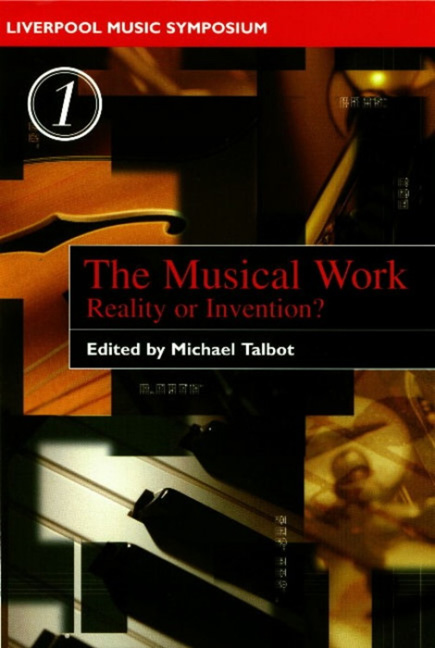Book contents
- Frontmatter
- Contents
- Notes on Contributors
- Introduction
- 1 Some Thoughts on the Work in Popular Music
- 2 Intertextuality and Hypertextuality in Recorded Popular Music
- 3 Work-in(g)-Practice: Configurations of the Popular Music Intertext
- 4 Work and Recordings: The Impact of Commercialisation and Digitalisation
- 5 The Practice of Early-Nineteenth-Century Pianism
- 6 Looking Back at Ourselves: The Problem with the Musical Work-Concept
- 7 ‘The Work’: An Evaluative Charge
- 8 The Work-Concept and Composer-Centredness
- 9 The Musical Artwork and its Materials in the Music and Aesthetics of Busoni
- 10 Re-composing Schubert
- 11 ‘On the Problems of Dating’ or ‘Looking Backward and Forward with Strohm’
- Index of Musical Compositions and Collections
- Index of Personal Names
Introduction
- Frontmatter
- Contents
- Notes on Contributors
- Introduction
- 1 Some Thoughts on the Work in Popular Music
- 2 Intertextuality and Hypertextuality in Recorded Popular Music
- 3 Work-in(g)-Practice: Configurations of the Popular Music Intertext
- 4 Work and Recordings: The Impact of Commercialisation and Digitalisation
- 5 The Practice of Early-Nineteenth-Century Pianism
- 6 Looking Back at Ourselves: The Problem with the Musical Work-Concept
- 7 ‘The Work’: An Evaluative Charge
- 8 The Work-Concept and Composer-Centredness
- 9 The Musical Artwork and its Materials in the Music and Aesthetics of Busoni
- 10 Re-composing Schubert
- 11 ‘On the Problems of Dating’ or ‘Looking Backward and Forward with Strohm’
- Index of Musical Compositions and Collections
- Index of Personal Names
Summary
Symposium. Skipping over the first definition of the word in the Shorter Oxford English Dictionary, which is ‘a drinking-party’, one soon arrives at this meaning: ‘a meeting or conference for discussion of some subject’. In fact, a typical symposium occupies an intermediate position between what one commonly understands by a ‘meeting’ and a ‘conference’. More ambitious (but also more focused) than the first, less grand (but also less diffuse) than the second, it is an ideal kind of event for the cash-strapped university of today.
The idea of holding a series of Liverpool Music Symposia arose from the coexistence, at this university, of two academic units, the Department of Music and the Institute of Popular Music, which cooperate happily enough in the sphere of undergraduate teaching but rarely find the opportunity to come into direct contact within the scholarly arena. To talk of ‘breaking down barriers’ is unnecessarily melodramatic. What is needed, rather, is a chance to knock ideas about in a common forum and, by so doing, to reach a clearer understanding of both the similarities and the contrasts that exist between the various musical traditions. It is also useful for students of so-called classical music to learn of (and, if appropriate, adopt or adapt) the concepts and terminology of modern popular music studies, just as the reverse must equally be true.
The theme of the first symposium suggested itself almost by chance. Having read Lydia Goehr's recent book The Imaginary Museum of Musical Works: An Essay in the Philosophy of Music, I suddenly realised that the musical work and the varied conception (or, sometimes, non-conception) of it – whether considered diachronically (through history) or synchronically (across the spectrum of musical traditions) – constituted the perfect subject: topical, controversial, multi-faceted and intellectually challenging. From there, the project quickly took wing. In my letter inviting contributions, I described the subject in the following, deliberately provocative terms:
Within the tradition of what we call, for want of a better term, Western art music, it has seemed axiomatic until quite recently that the basic unit of artistic production and consumption is the ‘work’ – a hard-edged artefact with a clear identity. One knows – or one thinks that one knows – a musical work as one knows a play, a book or a painting.
- Type
- Chapter
- Information
- The Musical WorkReality or Invention?, pp. 1 - 13Publisher: Liverpool University PressPrint publication year: 2000



